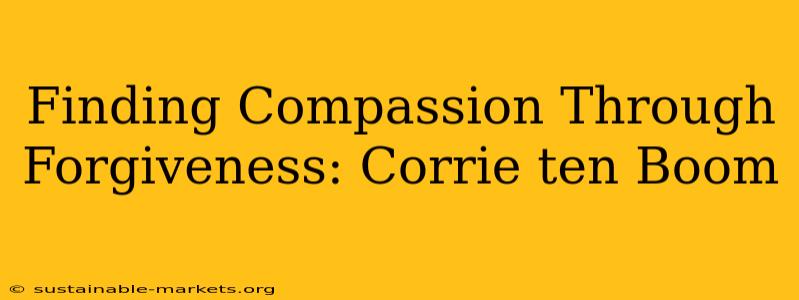Corrie ten Boom's life stands as a powerful testament to the transformative power of forgiveness. Her story, marked by unimaginable suffering during the Holocaust, yet illuminated by unwavering faith and an extraordinary capacity for compassion, continues to resonate deeply with people worldwide. This exploration delves into her journey, examining how she found forgiveness and how her example can inspire us to cultivate compassion in our own lives. We'll also address some common questions surrounding forgiveness and its profound impact.
What is Corrie ten Boom best known for?
Corrie ten Boom is best known for her unwavering faith and extraordinary acts of compassion during and after the Holocaust. She and her family risked their lives by secretly sheltering Jewish people in their home in Haarlem, Netherlands, during World War II. Their courageous actions led to their arrest and imprisonment in Ravensbrück concentration camp. While the horrors she witnessed were unspeakable, it was her experience in the camp and her subsequent life that cemented her legacy. She became a globally renowned speaker, sharing her powerful message of forgiveness and faith, inspiring countless individuals to embrace compassion and reconciliation. Her best-selling book, The Hiding Place, chronicles her experiences and has become a classic testament to the human spirit's resilience and capacity for love.
What did Corrie ten Boom forgive?
Corrie ten Boom forgave the Nazi guards who imprisoned and tortured her and her family, including her beloved sister Betsie. This wasn't a simple, immediate act; it was a process that unfolded over time, guided by her deep faith. Initially, the pain and trauma were overwhelming. However, through prayer and a growing understanding of God's grace, she discovered the liberating power of forgiveness. She realized that holding onto bitterness and resentment only perpetuated her suffering. Forgiving her persecutors didn't mean condoning their actions; it meant releasing herself from the burden of hatred and choosing to focus on healing and reconciliation. She understood that true forgiveness was not about the perpetrator but about the forgiver's own liberation.
How did Corrie ten Boom forgive?
Corrie ten Boom's journey toward forgiveness wasn't a singular event but a gradual process involving profound spiritual growth and self-reflection. It wasn't about forgetting the atrocities she experienced, but rather about choosing to release the anger and resentment that threatened to consume her. Key elements of her approach included:
-
Prayer and faith: Her unwavering faith in God provided her with strength, solace, and guidance throughout her ordeal. Prayer became her lifeline, enabling her to find peace and understanding.
-
Focusing on God's love: Instead of dwelling on the cruelty she endured, she actively focused on God's love and mercy. This perspective shifted her focus from revenge to compassion.
-
Recognizing the humanity of her persecutors: Even though they inflicted immense suffering, Corrie learned to see them as human beings, flawed and capable of both good and evil. This understanding fostered empathy and compassion, making forgiveness possible.
-
Seeking healing: Forgiveness wasn't a quick fix; it was a path towards healing. She understood that confronting her trauma and allowing herself to grieve was essential to her emotional recovery.
What is the significance of Corrie ten Boom's message of forgiveness?
Corrie ten Boom's message of forgiveness holds profound significance in today's world, characterized by conflict and division. Her life demonstrates that forgiveness is not about minimizing the harm inflicted but about choosing to break free from the chains of hatred and bitterness. Her story offers hope and inspiration, demonstrating that even in the face of unimaginable suffering, compassion and reconciliation are possible. Her message challenges us to confront our own hurts and grievances, urging us to embrace forgiveness as a path toward healing and a more compassionate world. Her legacy serves as a powerful reminder that forgiveness is not only a spiritual act but a profoundly liberating one. It’s a gift we give ourselves as much as to others.
How can we apply Corrie ten Boom's principles of forgiveness in our daily lives?
Corrie ten Boom's example offers practical guidance for applying forgiveness in our daily lives. We can begin by:
- Identifying our hurts and resentments: Acknowledging the pain caused by others is the first step toward healing.
- Praying for our offenders: This doesn't mean condoning their actions, but rather seeking strength and compassion for ourselves.
- Practicing empathy: Try to understand the other person's perspective, even if you don't agree with their actions.
- Letting go of anger and resentment: This is a gradual process, and it’s okay to seek professional help if needed.
- Focusing on self-healing: Prioritizing your own well-being is crucial for moving forward.
Corrie ten Boom’s life remains a beacon of hope, reminding us that even amidst unspeakable cruelty, forgiveness can pave the way to inner peace and a compassionate heart. Her enduring legacy inspires us to choose love, understanding, and ultimately, the freedom that true forgiveness provides.

